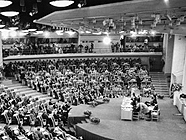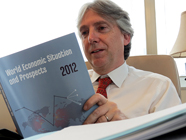
To grasp the background and stakes of Rio+20, it is useful to have a look at the Stockholm-to-Rio continuum of the Conferences, and to go through some key milestones in the long march that gave birth to international agreements on sustainable development. How did we move from Environment to Sustainable Development, what are the consequences of this move, and where are we going now?
1972 – Principles and Institutions
The United Nations Conference on the Human Environment held from 5–16 June in Stockholm, Sweden, was the first major international meeting addressing environmental issues in the context of human development. The Conference adopted a Declaration of 26 Principles. Principle 5 stated that “non-renewable resources of the Earth must be employed in such a way as to guard against the danger of their future exhaustion and to ensure that benefits from such employment are shared by all mankind.” The Meeting adopted an «Action Plan for the Human Environment” and led to the foundation of the United Nations Environment Programme (UNEP), as well as to the establishment of Environment departments. The world counted barely 10 ministries of environment in 1972 and ten times more a decade later. Two Heads of Government have attended the Conference: Prime Ministers Olof Palme of Sweden and Indira Gandhi of India, who famously declared that “Poverty is the worst form of pollution.”
1987 – Agenda for Action and Sustainable Development
The World Commission on Environment and Development, chaired by Norwegian Premier Gro Harlem Brundtland, was convened by the UN General Assembly in 1983 to formulate a long-term agenda for action. Its final report, entitled Our Common Future, introduced and popularized the concept of sustainable development to meet today’s needs without threatening the ability of future generations to meet their own needs. The Brundtland Report stressed that “a world in which poverty is endemic will always be prone to ecological and other catastrophes.”
1992 – The Earth Summit
The UN Conference on Environment and Development (UNCED) was held from 3-14 June in Rio de Janeiro, Brazil. It culminated in its three last days with the Earth Summit attended by 108 Heads of State and Government. The Summit adopted a set of 27 principles entitled the Rio Declaration on Environment and Development. Principle 15 called for a precautionary approach to protect the environment under uncertainty. The Summit also adopted Agenda 21, a comprehensive action plan to implement sustainable development. Significant binding Conventions on climate change (UNFCCC) and biodiversity (CBD) were open to signature in Rio and later came into force for the States who ratified them. The Summit called for the negotiation of a convention on desertification and drought, adopted a non-binding Statement of Forest Principles and recommended that the General Assembly establishes a Commission on Sustainable Development to monitor post-UNCED progress. Nearly 20,000 people took part in the Conference and Summit, including various economic and social sectors of civil society, giving birth to a new multi-stakeholder implementation paradigm. The Summit had enormous media coverage.
1994-1997 – Follow-up Conferences
In 1994 in Barbados, a global conference attended by 125 States and territories (46 of which were small island developing States and territories) adopted the United Nations Programme of Action on the Sustainable Development of Small Island Developing States, also called Barbados Programme of Action. A special session of the UN General Assembly called Earth Summit +5 was held in New York from 23 to 27 June 1997 to appraise implementation of Agenda 21, and other commitments made at the Earth Summit and adopted a “Programme for the Further Implementation of Agenda 21.” Based upon the Earth Summit Forests Principles and a chapter of Agenda 21, the Economic and Social Council (ECOSOC) established in 2000 the UN Forum on Forests (UNFF), a subsidiary body aimed at promoting “the management, conservation and sustainable development of all types of forests and to strengthen long-term political commitment to this end”.
2002 – Review and sectorial plans
The World Summit on Sustainable Development was held from 26 August to 4 September 2002, in Johannesburg (South Africa) to review the results of UNCED a decade later and reinvigorate the global commitment to sustainable development. Attended by nearly one hundred world leaders, it adopted a Declaration and a Plan of Implementation including agreements on oceans and fisheries protection, sanitation, freshwater, energy and poverty. The Johannesburg process also initiated a new type of voluntary multi-stakeholder initiatives called “Partnerships for Sustainable Development.” Some 300 such partnership agreements were launched during the Summit. Participation of the civil society was also massive.
2005-2007 – Adoption of non binding instruments
An international meeting was held in Mauritius in 2005 to review the Barbados Programme of Action. The 129 participating Member States unanimously adopted the “Mauritius Strategy for the further implementation of the Programme of Action for the Sustainable Development of Small Island Developing States.” After years of intense negotiations, the 7th Session of the UN Forum on Forests adopted in 2007 the “Non-Legally Binding Instrument on All Types of Forests”, the first international instrument for sustainable forest management ever adopted by UN Member States.
2012 – Rio+20 – Focus areas and voluntary commitments?
The UN Conference on Sustainable Development, to be held in Rio de Janeiro from 20 to 22 June 2012, aims at bringing about real change by setting a new development agenda and galvanizing progress towards a sustainable future — the Future We Want. The Conference focuses on two themes: a green economy in the context of sustainable development and poverty eradication and the institutional framework for sustainable development. The Conference will adopt an outcome document expected to notably highlight seven areas needing priority attention, including decent jobs, energy, sustainable cities, food security and sustainable agriculture, water, oceans and disaster preparedness.
Following the strides made on poverty eradication through the Millennium Development Goals, Rio+20 is expected to agree to defining sustainable development goals that would mobilize the international community, promoting action and monitoring progress. At Rio+20, governments, major groups and other civil society sectors, including business and industry, are also expected to launch new voluntary commitments and initiatives for sustainable development which will be compiled in a registry of commitments as part of the legacy of the Conference. More than 50,000 people are expected to participate to the Conference and over 500 side events are planned.
For more information: http://www.uncsd2012.org/rio20/index.html

